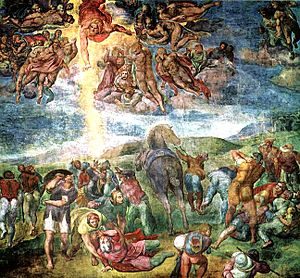[What follows is the text an email, with some emendations, that I wrote over a year ago.]
As you may already know, I have problems with the NIV [New International Version]. The translation of 2 Timothy 3:16 is particularly irksome. Since the time of the Latin Vulgate through the Authorized Version (KJV) and beyond, the word θεόπνευστος (theópneustos) was understood to mean “divinely inspired.”
omnis scriptura divinitus inspirata . . .
Whoever wrote 2 Timothy may have coined the word, but a form of it does appear in Pseudo-Plutarch. In Book 5, Chapter 2 of Placita Philosophorum, the author writes:
Herophilus [says] that dreams which are caused by divine instinct (θεοπνεύστους) have a necessary cause . . .
The KJV translates 2 Timothy 3:16 as follows:
All scripture is given by inspiration of God, and is profitable for doctrine, for reproof, for correction, for instruction in righteousness:

Nearly all its descendants (NASB, NET, ASV, etc.) follow suit. For centuries, it simply meant that the men who wrote the scriptures worked under the influence of divine inspiration. The living, continuing Church (its clergy and theologians) would interpret those scriptures as needed, because although under the influence of the spirit, men are still imperfect.
I cannot find the unusual translation, God-breathed, before 1849. At first, we see it used only as a hyper-literal rendering to argue that scripture is divine revelation. There’s really nothing extraordinary or new about that claim. But by the turn of the century, we start to see the argument blossom into the notion that scripture itself is a divine creation, reminiscent of the scenes in Genesis wherein God’s spirit moves across the face of the waters or when God breathes life into Adam’s nostrils. [Note: In its most extreme form, the Bible seems to become a kind of divine emanation, or at least a holy conduit through which God speaks to us.]
By mid-century, Christian fundamentalists were using it as an argument for the inerrancy of all scripture. And here’s where it really takes off. In 1964, the conservative Evangelical Christian, Gleason Archer, wrote (in A Survey of Old Testament Introduction pp. 20-21): Continue reading “Bibliolatry, “God-Breathed Scripture,” and the NIV”




